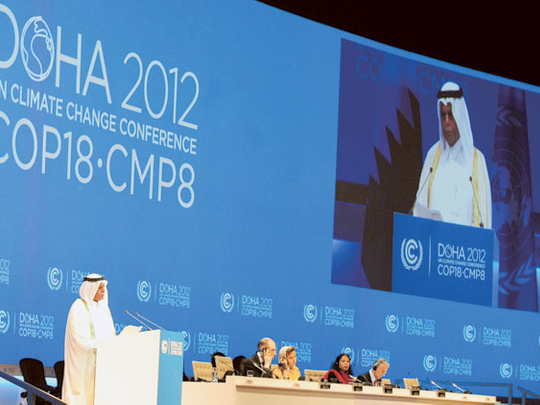
DOHA: Nearly 200 nations launched a fresh round of United Nations climate talks in Doha on Monday, facing urgent appeals to scale up the fight against Earth-warming greenhouse-gas emissions.
“Time is running out,” UN climate chief Christiana Figueres told a press conference.
“The door is closing fast on us because the pace and the scale of action is simply not yet where it must be.”
The run-up to the 12-day conference — the annual climax to negotiations on climate change — coincided with a welter of warnings that violent events like superstorm Sandy will become commonplace if mitigation efforts fail.
Experts said pledges to mitigate greenhouse gas pledges were falling dramatically short of limiting warming to the UN goal of two degrees Celsius (3.6 degrees Fahrenheit) above pre-industrial levels.
“All of these reports agree that it is much more preferable to act now because it is safer and much less costly than to delay,” said Figueres.
“This is a historic conference of crucial importance,” added Qatar’s conference president, Abdullah Al Attiyah. “We must work seriously in the next two weeks... be flexible and not dwell [on] marginal matters.”
Topping the talks under the UN’s Framework Convention on Climate Change (UNFCCC) is the future of the Kyoto Protocol, the world’s only binding pact for curbing carbon emissions.
The protocol, whose first commitment period runs out on December 31, currently commits about 40 rich nations and the EU to an average five per cent greenhouse gas reduction from 1990 levels.
The accord is a touchstone for developing countries and green campaigners.
But critics say it is badly flawed, as it does not include the United States and China, the world’s biggest emitters, in the binding targets.
Getting a deal on Kyoto’s future would smooth the way towards a new global treaty that would be sealed in 2015 and take effect in 2020.
Prospects, though, are soured by discord on how long the next Kyoto commitment period should last and the scope of its carbon pledges.
The EU, Australia and some small Kyoto parties have said they would take on commitments in a second period, but New Zealand, Canada, Japan and Russia will not.
“In Doha, governments must agree to the continuation of the Kyoto Protocol and close the loopholes that could give countries a free pass to pollute for years,” urged Greenpeace’s Martin Kaiser.
“At the end of a year that has seen the impacts of climate change devastate homes and families around the world, the need for action is obvious and urgent.”
Also crucial is for delegates to draft a work plan for arriving in the next 36 months at the new global climate deal.
Negotiators, to be joined in the last four days by cabinet ministers from more than 100 nations, will be under pressure to raise pre-2020 emission reduction targets.
And rich nations will be expected to come up with funding for the developing world’s mitigation actions.
“Developing countries are heading towards a climate ‘fiscal cliff’ without any certainty about how they will be supported to adapt to climate change after 2012 draws to a close,” said Oxfam climate change policy adviser Tim Gore.











